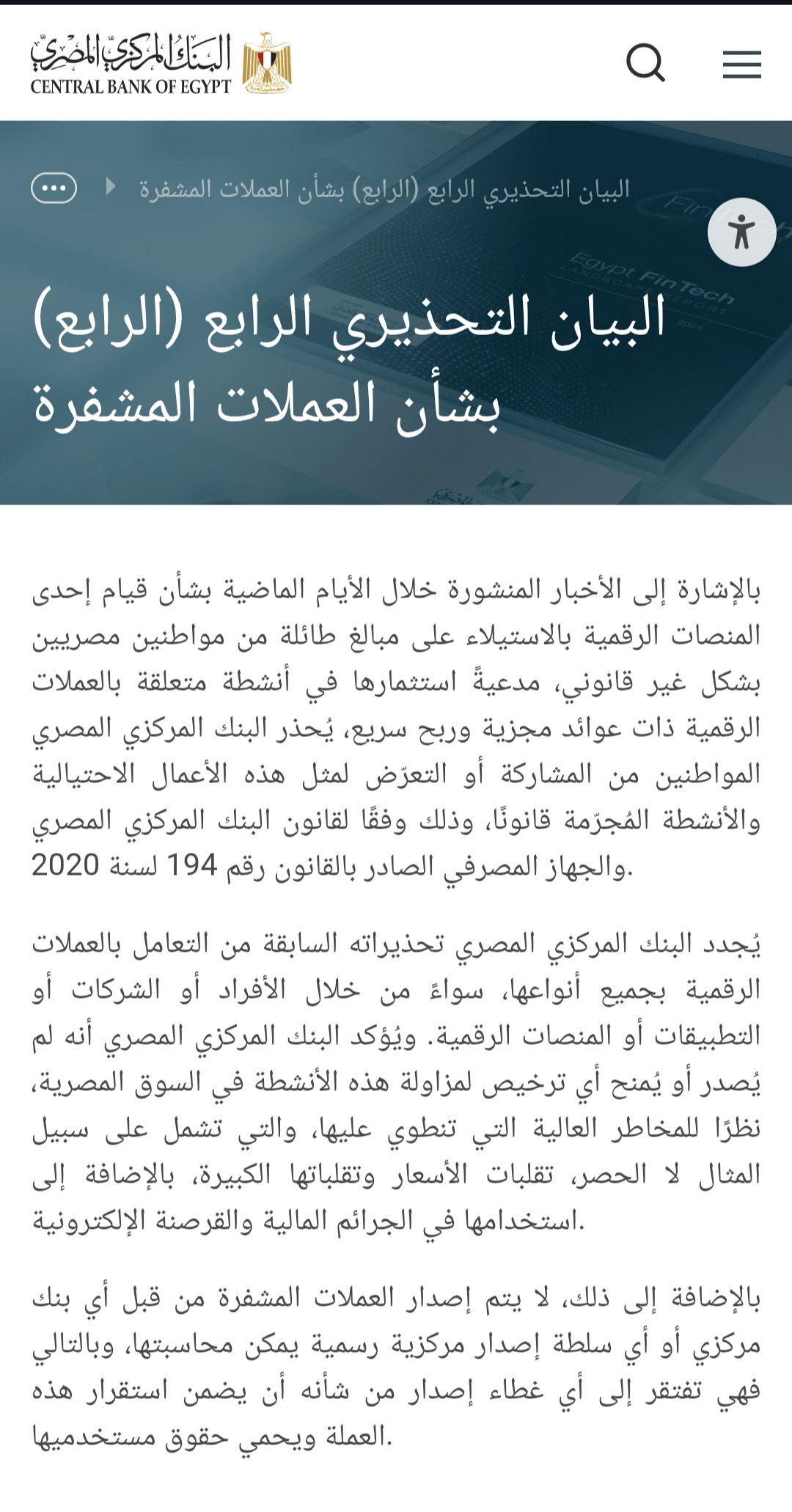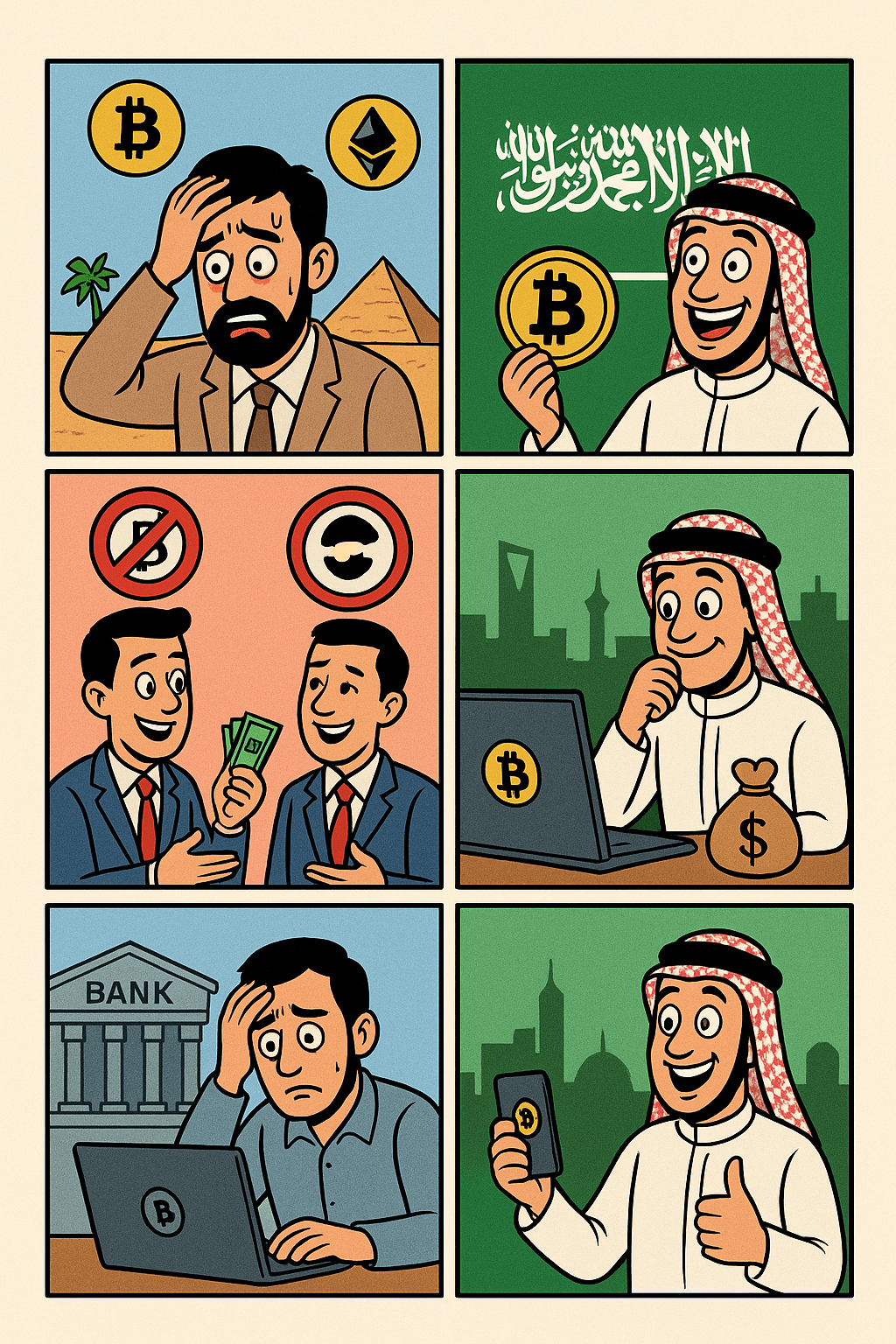Buying and selling crypto person-to-person (P2P) is popular among traders, especially with no direct alternatives with banks. However, in reality, this kind of dealing is not always safe... there are problems that can ruin your day, such as freezing your bank account, scams, or even getting into legal trouble.
The legal situation you need to know.
In Egypt, the Central Bank of Egypt repeatedly warns against dealing in digital currencies, and Banking Law No. 194/2020 makes issuing, trading, or promoting digital currencies without a license a sensitive matter and could expose you to accountability or account freezing if the transfers enter the banking system in an unclear manner.
In Saudi Arabia, there is no comprehensive and clear legislation for cryptocurrencies so far. Regulatory bodies (SAMA and financial entities) are warning, and banks are adhering to a strict policy towards transactions that may be used for money laundering or fraud. Banks usually engage in crypto transactions without clear approvals.
In essence, owning USDT is not a crime, but when the money enters a bank account, you must be ready to prove its source; otherwise, the bank may freeze the account due to suspicion of money laundering or unauthorized activity.

The most important risks you may face in P2P.
Freezing of the bank account due to too many transfers or unclear sources.
Fraudulent proof of a fake transfer, chargeback, or transfer from a stolen account.
Delay in settling the transaction if the bank requested documents or the authorities requested an investigation.
Loss of an investment opportunity if your account is frozen.
What is Escrow and why is it very important?
P2P on most platforms uses the Escrow system; the currency is held in escrow until the seller confirms that the money has actually arrived, and if a dispute arises, you can open a dispute that Binance's team will resolve after reviewing the evidence. This is very important to reduce the risk of fraud.
Tips to keep you safe, apply them literally.
Keep every deal within the Escrow, trust me, we say this a lot for a reason.
Ensure the bank account holder's name matches the username on the platform — if it doesn't match, avoid it.
Don't release the currency until you see the money has entered your account, and you must really verify the transaction number, not just a picture of the receipt.
Divide large amounts into installments or days to reduce suspicion.
Keep everything: screenshots, the Escrow record, chat logs, transfer receipts, transaction numbers, names, and numbers of buyers.
If you are going to deal in fixed and large amounts, consider opening a dedicated bank account for trading and inform the bank of your activities transparently, or if you are in Egypt, consult a lawyer.
If someone asks you to deal outside of P2P or keeps the transfer notes outside, be cautious; these are signs of danger.
Danger signals that require you to stop the transaction immediately.
The buyer is suspiciously pressured or in a hurry.
The bank account is not in the buyer's name, or there was a last-minute change in payment details.
The buyer requests to complete the transaction outside the Escrow.
An unclear receipt image or the transaction PIN is missing.
If they froze your account.
Do not perform any transactions on the suspended account.
Contact the bank immediately and ask for the reason for the freeze, and get the name of the employee and the report/reference number.
Prepare the evidence immediately: screenshots of the Escrow, transfer receipts (transaction IDs), chats, buyer data.
Send all evidence officially via email or visit the branch and hand them a copy and refuse verbal communication only. Keep all communication written.
Open a dispute on Binance if the transaction was related to P2P and request an official report about the Escrow or the order history. Binance allows you to provide evidence and open a dispute.
If the bank raised the issue to law enforcement, you must consult a lawyer immediately.
Continuously monitor and take copies of everything, and ask for a tracking number from the bank.
The market has an opportunity for profit if you learn safety methods. People who organize their work and write everything down usually win and do not face major problems.
P2P is beneficial if you know how to protect yourself; liquidity is available, and the subscription market (OTC) and P2P allow you to expand your capital quickly.